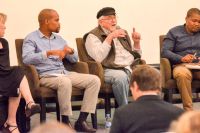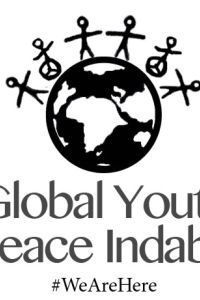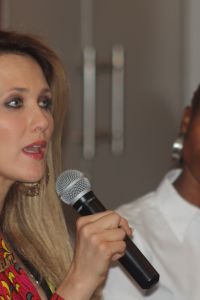Mukhtar Lee, of Hanover Park in Cape Town
This follows a series of Nelson Mandela Foundation youth screenings and dialogues held around 1994, as part of marking the 20th anniversary of democracy and as we celebrate the life and legacy of a global icon.
It is hard to believe that the “Mandela miracle” nearly didn’t happen. What history forgets is that during the last year of apartheid, South Africa was on the brink of catastrophe, with certain groups intent on derailing the first free elections.
Now for the first time, those responsible for the countless deaths and widespread mayhem explain (in the documentary) how they nearly brought the country to its knees. 1994 shows how far some went to thwart democracy, but how they have now made an uneasy peace with the Rainbow Nation in their own way.
Up for debate, following the screening, included whether the Truth and Reconciliation Commission (TRC) had achieved its goals; what the political, social and economic situation in South Africa is now; and whether freedom has brought equality.
The documentary was screened as part of the Global Youth Peace Indaba during the Nelson Mandela Foundation’s session, titled “Intergenerational Memory and Transitional Justice”.
The Global Youth Peace Indaba was originally called the Youth Summit, and was to be part of the whole World Summit of Nobel Peace Laureates programme, which was subsequently suspended. The indaba was held at Tsogo Sun’s Cape Sun Hotel in Cape Town, and ended on 15 October.
The documentary explores the role played by those responsible for countless deaths and widespread mayhem in the lead-up to the elections. For the first time many of them are interviewed, and they explain how they nearly brought South Africa to its knees.
In the year leading up to the April 1994 elections, close to 20 000 people lost their lives, documentary co-director Meg Rickards said.
What is clear is that it is essential for everyone, especially the youth, to understand what South Africa went through. It is even more important that young people understand the context that informs democracy and how young people have to take ownership of the legacy left by Madiba, to ensure we realise true social justice in South Africa and beyond.
The screening was followed by a dialogue session facilitated by Rickards. The panel consisted of Sunday Times Cape Town bureau chief Sam Mkokeli; journalist, commentator and author specialising in political and economic analysis and labour matters Terry Bell; and University of Cape Town Centre for Law and Society researcher Dr Mbongiseni Buthelezi.
Eriel Haung was one of the delegates
Bell told the audience the documentary is important, as it leaves viewers with questions – which is important to any documentary.
He said that South Africa is the most unequal society in the world; there is a big wage and employment gap. People have to understand the past to know the present, he said.
Bell provided further context to the documentary. He said what needs to be remembered is that for 40 years there had been a deliberate policy, completely crippling people academically, economically and politically.
“If you have had generations of that, you need massive programmes,” he said. He added that the government should have reached out for help offered by the international community to implement programmes to create a more equal society.
“We must let the youth understand what happened,” Bell said.
Delegate Mukhtar Lee, of Hanover Park in Cape Town, said he had realised that “freedom isn’t free”. Many people view their assets as more valuable then freedom, and people “don’t realise the price we paid”, he said.
Eriel Huang said she questions the resistance among young people to talking about gaps in social justice. “There is a space between talk and action,” she said.
For American teenager Brittany Gray, of the American Friends Service Committee, the documentary was enlightening, and she realised that sometimes you have to have bloodshed in order to move forward.
The panellists also fielded questions on the role of the TRC, and the general feeling was that the TRC should have played a further role in healing South Africa.
Mkokeli said that even if the TRC was to be expanded, there are many other “TRCs” in existence; he cited the Marikana Commission as an example.
Buthelezi said the TRC had had successes and failures. He said reconciliation is a long-term process and South Africa has not followed through enough on this. “The TRC should have continued; we needed to create the spaces at universities and high schools (to encourage debate and healing),” Buthelezi said.
Buthelezi said studies have shown that instead of people living together, there is more polarisation.
Brittany Gray, of the American Friends Service Committee
The panel was of the opinion that the economic divide plays a huge role in entrenching polarisation, as the majority of working people earn about R4 000 a month, compared with the top end of the spectrum, where people earn between R100 000 and R200 000 per month.
Mkokeli said polarisation can be seen over sporting weekends: soccer is mostly watched by black people, while rugby is mostly watched by white people. “It is difficult to have theses conversations without being called a racist,” he said.
Bell felt that there was a way to end poverty and inequality, if everyone worked together. “We can say no more to poverty on Earth. We have the resources, we have enough food resources, there are enough resources to feed and clothe everyone; we can liberate humanity,” Bell said.
The quintessence of South Africa’s rocky road to democracy is a path that stretches equally to the past as to the future.
The film, while illustrating hardships in overcoming the past, talks to the future challenges faced by South Africans.
The message is especially pertinent to young people – it was young people who helped drive change in South Africa, and it is now up to young people to keep the flame of change burning.
The point of departure for dialogue, and the point of talking, is about how we can craft solutions for the present – not necessarily based on the past, but how we are going to do it.
The Foundation remains committed to driving dialogue about critical social issues among South Africa’s youth.
Change is inevitable, and it is up to the youth – through the continued pursuit of excellence, and the ability and willingness to learn and to then mentor through the transfer of skills and knowledge – to lead the way.

Meg Rickards facilitated the panel discussion between University of Cape Town Centre for Law and Society researcher Dr Mbongiseni Buthelezi; journalist, commentator and author Terry Bell; and Sunday Times Cape Town Bureau Chief Sam Mkokeli. Photo courtesy of Steve Sherman, of the Global Youth Peace Indaba
In his wisdom, Madiba always urged everyone to work together to ensure everyone helps to build the future. “The foundation has been laid – the building is in progress. With a new generation of leaders and a people that rolls up its sleeves in partnerships for change, we can and shall build the country of our dreams!”
The Albert Schweitzer Institute and the Chaeli Campaign, winner of the 2011 International Children’s Peace Prize, organised the Indaba.
Stakeholders included:
The City of Cape Town
Quinnipiac University
The FW de Klerk Foundation
The American Friends Service Committee
Hartford Public High Schools
The University of Cape Town
Georgetown University
East Stroudsberg University
Soka University of Tokyo
The Monterey institute of International Studies
The University of Notre Dame

